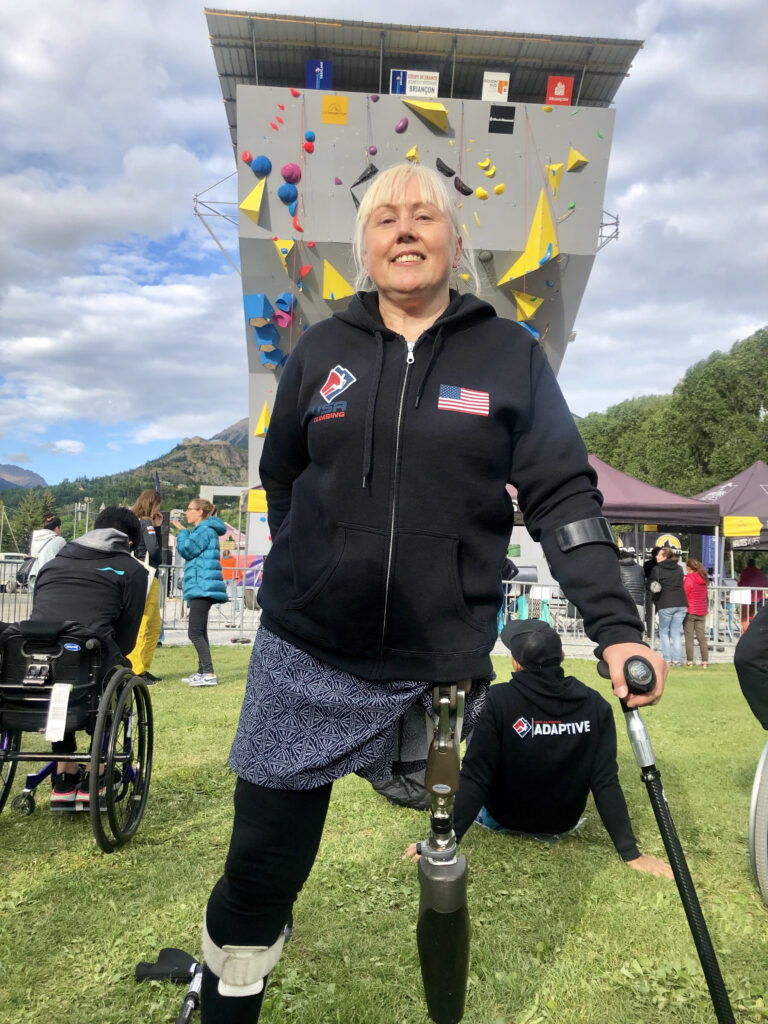By Rene Agredano
Lauren Pine loved taking care of hospital patients.
But on November 15, 2017, the New York City oncology nurse suddenly found herself being cared for by others. A trash truck driver didn’t see her in a crosswalk, and her life changed overnight. Among other life-threatening injuries, Pine suffered a traumatic hip disarticulation after being struck and dragged by the ten-wheel dump truck. The accident ended her nursing career but taught her important lessons about building financial security with limited income.

LEARN TO TELL YOUR STORY
Whether you’re applying for a college scholarship, appealing a hospital bill, or seeking help with adaptive equipment, the ability to clearly and quickly convey your situation is key to getting what you need if you cannot afford to pay for it. Pine says that asking for help is far less intimidating when you can share your story with confidence.
“Find your voice. Start practicing telling your story,” she says. “Reading Amplitude helped me hone mine, and the Amputee Coalition has a page on their website about how to write your story in a way to convey quickly to others who you are. You are powerful and can facilitate change.”
PARTNER UP TO SAVE MONEY
Community support has been instrumental in helping Pine cope with the aftermath of amputation. Soon after her accident, she discovered that the common absurdities and injustices of health-system bureaucracy quickly follow limb loss. When the pile of medical bills, explanations of benefits, and other accident-related detritus became overwhelming, other amputees helped cut through the confusion.
“Call the Amputee Coalition or have a friend call and sign up for a peer buddy,” she suggests. “Find your local support group and stay connected, even if online or via phone. This alone will lead to a lifetime of learning, resources, and ways to feel empowered.”
Today, she feels less alone and is grateful that her peers have also taught her how to reduce the costs of being an amputee, such as by negotiating hospital bills and reaching out to charities. Since meeting others in support groups, Pine has found organizations to sponsor her attendance at conferences and provide crucial mobility equipment and other important services.
Learning how to tell her story and ask for things she needs has made her a stronger, better advocate for all amputees, but it wasn’t long ago when the overwhelming nature of dealing with insurance billing got the best of her. Pine realized she couldn’t do everything herself.
“I knew I needed someone neutral to ‘witness my pain’ and motivate me to make the calls,” she explains.
She took a chance on hiring a part-time administrative assistant to help. Together the two women tackled tasks such as calling insurance companies to file appeals, disputing medical billing errors, and applying to charities for cost-prohibitive equipment.
FIND YOUR HEALTHCARE ALLIES
As Pine and other amputees discover, being an amputee is an ongoing battle to pay for the ever-increasing costs of equipment and medications. Don’t be shy about asking your O&P team for leads; an experienced prosthetist can be your greatest ally. Many work directly with local nonprofit organizations, religious institutions, and community groups that provide financial help and free durable medical equipment.
You may also be able to save on your prescription drugs. Patient Assistance Programs (PAPs) were created by pharmaceutical companies to provide free or discounted medicines to people who are unable to afford them. Spend time browsing website directories such as RxAssist, GoodRx, and the Medicine Assistance Tool to search for public and private assistance to help cover your medications.
Whether you’re applying for assistance with medication, a prosthesis, a power wheelchair, or adaptive driving equipment, each program has its own qualifying criteria. Make the application process easier by following financial assistance application tips on the Amputee Coalition’s website. If you have a special interest in sports, many organizations exist to help people with physical challenges get active by covering the cost of adaptive sports gear, training, and other expenses.
“Challenged Athletes Foundation [CAF] gave me funding for an adaptive riding saddle and special seat cushion, an expense I never could have afforded on my own,” Pine says.
EARN MORE INCOME
For some new amputees, limb loss ignites a desire to follow an entirely new career path through vocational rehabilitation or higher education. For instance, Eric Powers, who was featured in Amplitude’s November/December 2019 issue, discovered that returning to college redirected his energies away from self-destructive behaviors. Many educational, career-building, and job search organizations help people with disabilities become financially solvent by helping them learn new trades or embark on a career upgrade through advanced education.
If college is in your future, start searching for scholarships before resorting to student loans. The free money is out there, whether you physically attend classes at a local college or take the online education path. You’ll have a shot at many education scholarships specifically for people living with limb loss, limb difference, or a general disability. Grantors range from Florida’s Ye Notorious Krewe of the Peg Leg Pirate to The National Amputation Foundation’s Claude S. Weiler Scholarship to the Amputee Coalition’s college scholarships.
GET YOUR TICKET TO WORK
College isn’t the only pathway to better employment after limb loss. Public services such as the US government’s Ticket to Work Program help participants find a new job or start a new business without risking their Medicare, Medicaid, and some or all of their cash benefits during the transition.
Through Ticket to Work, people whose disability may have kept them out of the job market can get free occupational help coordinated among private industry, state vocational rehabilitation agencies, and education providers. These organizations contract with the program to provide counseling, vocational rehabilitation, training, and job placement to people younger than age 65 who receive Social Security Disability Insurance (SSDI) income or Supplemental Security Income (SSI). Ticket to Work success stories are abundant, including Laura, an amputee from Iowa who finished college and became a prosthetist with help from the program.
GET ON THE WORK-FROM-HOME TRAIN
Before the COVID-19 pandemic, work-from-home jobs and business advertisements were often well-disguised scams that left hopeful job seekers with less money than when they started.
“Don’t take their word for it—many of these ‘jobs’ are scams, or don’t deliver on the claims they make,” warns the Federal Trade Commission.
Today, things are changing as the pandemic has boosted the number of legitimate work-from-home job opportunities. According to a 2020 Gallup poll, 62 percent of employed Americans worked from home during the crisis, twice as many as before the pandemic. For the 40 percent of American jobs that can be performed at home, remote work is likely to become a new normal, as shared in The Atlantic. The article goes on to state that online employment classifieds reflect a remote work trend; today, over 11 percent of all job postings on ZipRecruiter are for work-from-home jobs, up from 1.3 percent before the pandemic. Working from home is an option for more people than ever, but carefully screen the company before applying. The FTC lists tips on its website to guide you: Search Work-at-Home Businesses.
MANAGE THE MONEY YOU EARN
Whether your income source is disability, a retirement plan, or a job, knowing how to grow your money and save more is key to a better quality of life. That’s a hard task in an era when more than 60 percent of personal bankruptcy filings in America are the result of medical debt. If you believe you are facing the same situation, consider talking to a credit counseling service. According to a 2019 study, credit counseling can lead to significant debt reduction. The study, from the Brown School at Washington University in St. Louis, showed that people who obtained debt counseling reduced their revolving debt by an average of $3,637 and reduced their total debt by $11,341. Hanging on to the money you do have may also require you to hire a financial expert but use care in who you hire. The Special Needs Alliance’s list of resources features financial services companies that have made a significant commitment to families and individuals requiring special needs planning. Look for a chartered special needs consultant with the ChSNC credential that represents extra training to help people with special needs meet their financial planning goals.
Whether you’re new to living on disability income or not, the financial goals you aspire to aren’t necessarily unreachable because of your current situation. The amputee community is a strong one that cuts across all race, gender income, and education levels. It is filled with resources that can help you live your best life. Pine discovered this once she learned to accept the help that is waiting.
“People used to offer me help with groceries and I would say, ‘No, no, I’m okay.’” she recalls. “Now I say, ‘Yes, thank you!’ At times we may feel like charity cases, but we are also giving back in other ways. If it makes someone feel good to give you a gift, allow them that wonderful feeling.”
START AN ABLE SAVINGS PLAN

If your disability was diagnosed before age 26 and you live in the United States, an ABLE savings plan offers a simple, affordable way to save money without risking your Medicaid, Supplemental Security Income (SSI), or other means-tested benefits you need now or in the future. The savings program also offers tax advantages for eligible residents of all 50 states. Account holders can watch earnings on investments grow, free of federal taxes. Some states also offer a state income tax deduction for contributions to an ABLE account. Many people use it in conjunction with a special needs trust, another type of savings account that protects resources.
Unlike other tax-advantaged savings programs such as flexible spending accounts and special needs trusts, ABLE account funds can be spent on any expense related to maintaining health, independence, and quality of life. For example, you can save for college, a modified vehicle, or cover everyday expenses such as housing, food, and transportation.
“Each person is unique, and the needs of individuals can vary depending on age, disability, and other specific circumstances,” explains Sarah Pennington, brand manager for ABLEnow, the Virginia state ABLE program. “An ABLE account is a financial tool for eligible individuals at any age.”
Most customers manage their ABLE account independently online or with the help of an authorized representative, such as a parent.
For more information, visit ablenrc.org
LEARN MORE ABOUT FINANCIAL STRATEGIES WITH THESE LINKS
INSURANCE DENIALS AND MEDICAL BILLS
“How to Win Your Insurance Appeal in 5 Easy Steps”
“Overturning Insurance Denials”
Preventing Surprise Medical Bills
ASSISTANCE WITH PRESCRIPTIONS, PROSTHESES, AND ADAPTIVE EQUIPMENT
EDUCATION, SCHOLARSHIPS, AND FINANCIAL AID
“Is Online Education Right for You?”
Ye Notorious Krewe of the Peg Leg Pirate
Amputee Coalition’s college scholarships
25 Great Scholarships for Amputees
JOB RESOURCES
Ticket to Work Success Stories
Amputee Employment Amidst COVID-19
Companies With Work From Home Jobs
MONEY MANAGEMENT




